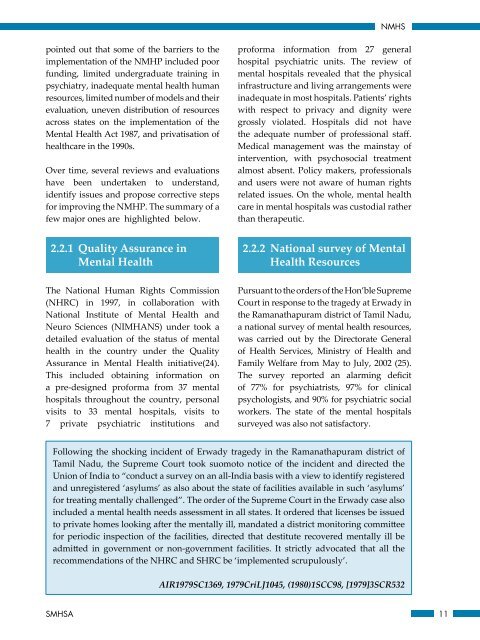National Mental Health Survey of India 2015-16
NMHS%20Report%20%28Mental%20Health%20Systems%29%201
NMHS%20Report%20%28Mental%20Health%20Systems%29%201
You also want an ePaper? Increase the reach of your titles
YUMPU automatically turns print PDFs into web optimized ePapers that Google loves.
NMHS<br />
pointed out that some <strong>of</strong> the barriers to the<br />
implementation <strong>of</strong> the NMHP included poor<br />
funding, limited undergraduate training in<br />
psychiatry, inadequate mental health human<br />
resources, limited number <strong>of</strong> models and their<br />
evaluation, uneven distribution <strong>of</strong> resources<br />
across states on the implementation <strong>of</strong> the<br />
<strong>Mental</strong> <strong>Health</strong> Act 1987, and privatisation <strong>of</strong><br />
healthcare in the 1990s.<br />
Over time, several reviews and evaluations<br />
have been undertaken to understand,<br />
identify issues and propose corrective steps<br />
for improving the NMHP. The summary <strong>of</strong> a<br />
few major ones are highlighted below.<br />
pr<strong>of</strong>orma information from 27 general<br />
hospital psychiatric units. The review <strong>of</strong><br />
mental hospitals revealed that the physical<br />
infrastructure and living arrangements were<br />
inadequate in most hospitals. Patients’ rights<br />
with respect to privacy and dignity were<br />
grossly violated. Hospitals did not have<br />
the adequate number <strong>of</strong> pr<strong>of</strong>essional staff.<br />
Medical management was the mainstay <strong>of</strong><br />
intervention, with psychosocial treatment<br />
almost absent. Policy makers, pr<strong>of</strong>essionals<br />
and users were not aware <strong>of</strong> human rights<br />
related issues. On the whole, mental health<br />
care in mental hospitals was custodial rather<br />
than therapeutic.<br />
2.2.1 Quality Assurance in<br />
<strong>Mental</strong> <strong>Health</strong><br />
2.2.2 <strong>National</strong> survey <strong>of</strong> <strong>Mental</strong><br />
<strong>Health</strong> Resources<br />
The <strong>National</strong> Human Rights Commission<br />
(NHRC) in 1997, in collaboration with<br />
<strong>National</strong> Institute <strong>of</strong> <strong>Mental</strong> <strong>Health</strong> and<br />
Neuro Sciences (NIMHANS) under took a<br />
detailed evaluation <strong>of</strong> the status <strong>of</strong> mental<br />
health in the country under the Quality<br />
Assurance in <strong>Mental</strong> <strong>Health</strong> initiative(24).<br />
This included obtaining information on<br />
a pre-designed pr<strong>of</strong>orma from 37 mental<br />
hospitals throughout the country, personal<br />
visits to 33 mental hospitals, visits to<br />
7 private psychiatric institutions and<br />
Pursuant to the orders <strong>of</strong> the Hon’ble Supreme<br />
Court in response to the tragedy at Erwady in<br />
the Ramanathapuram district <strong>of</strong> Tamil Nadu,<br />
a national survey <strong>of</strong> mental health resources,<br />
was carried out by the Directorate General<br />
<strong>of</strong> <strong>Health</strong> Services, Ministry <strong>of</strong> <strong>Health</strong> and<br />
Family Welfare from May to July, 2002 (25).<br />
The survey reported an alarming deficit<br />
<strong>of</strong> 77% for psychiatrists, 97% for clinical<br />
psychologists, and 90% for psychiatric social<br />
workers. The state <strong>of</strong> the mental hospitals<br />
surveyed was also not satisfactory.<br />
Following the shocking incident <strong>of</strong> Erwady tragedy in the Ramanathapuram district <strong>of</strong><br />
Tamil Nadu, the Supreme Court took suomoto notice <strong>of</strong> the incident and directed the<br />
Union <strong>of</strong> <strong>India</strong> to “conduct a survey on an all-<strong>India</strong> basis with a view to identify registered<br />
and unregistered ‘asylums’ as also about the state <strong>of</strong> facilities available in such ‘asylums’<br />
for treating mentally challenged”. The order <strong>of</strong> the Supreme Court in the Erwady case also<br />
included a mental health needs assessment in all states. It ordered that licenses be issued<br />
to private homes looking after the mentally ill, mandated a district monitoring committee<br />
for periodic inspection <strong>of</strong> the facilities, directed that destitute recovered mentally ill be<br />
admitted in government or non-government facilities. It strictly advocated that all the<br />
recommendations <strong>of</strong> the NHRC and SHRC be ‘implemented scrupulously’.<br />
AIR1979SC1369, 1979CriLJ1045, (1980)1SCC98, [1979]3SCR532<br />
SMHSA<br />
11


